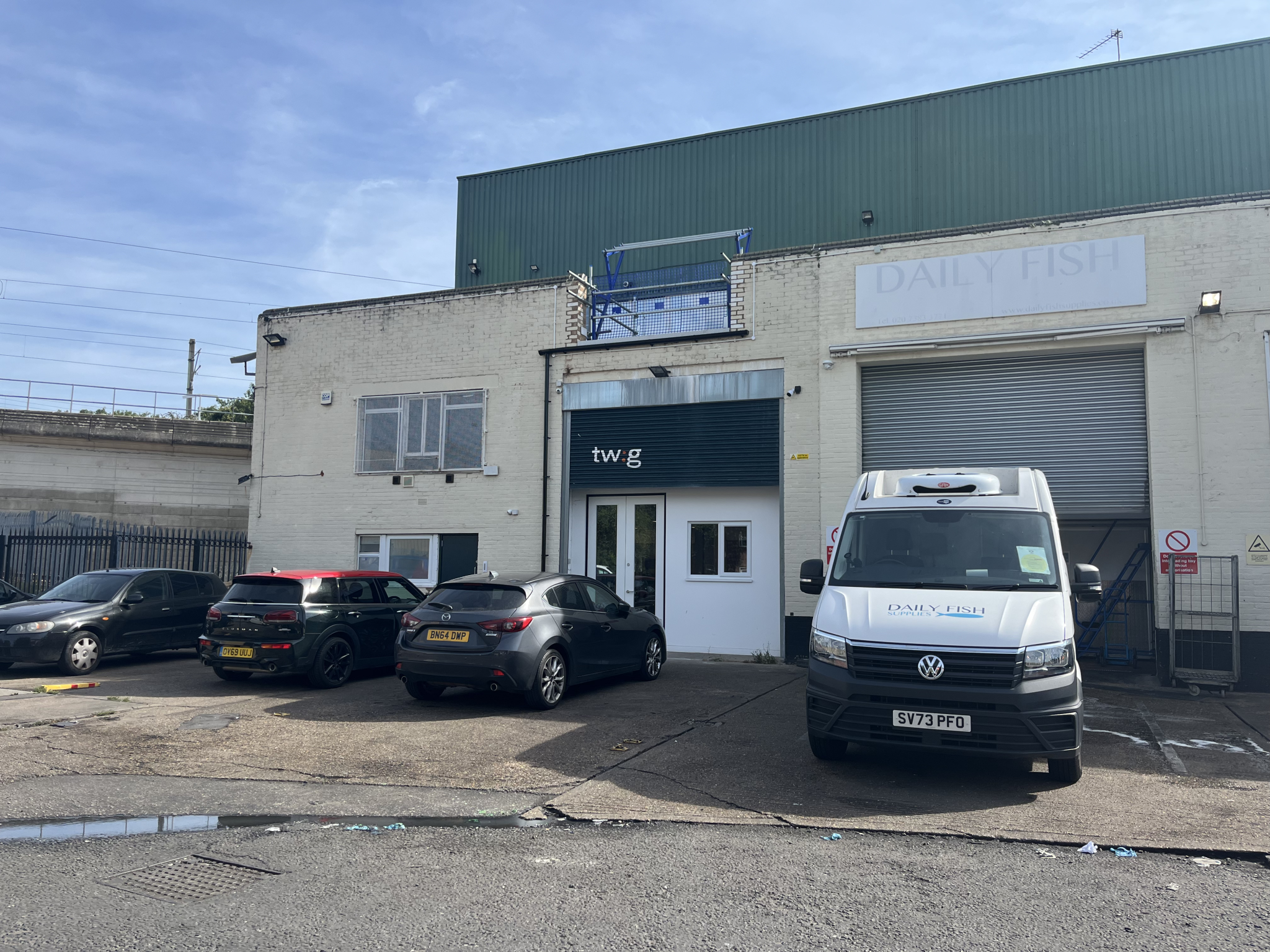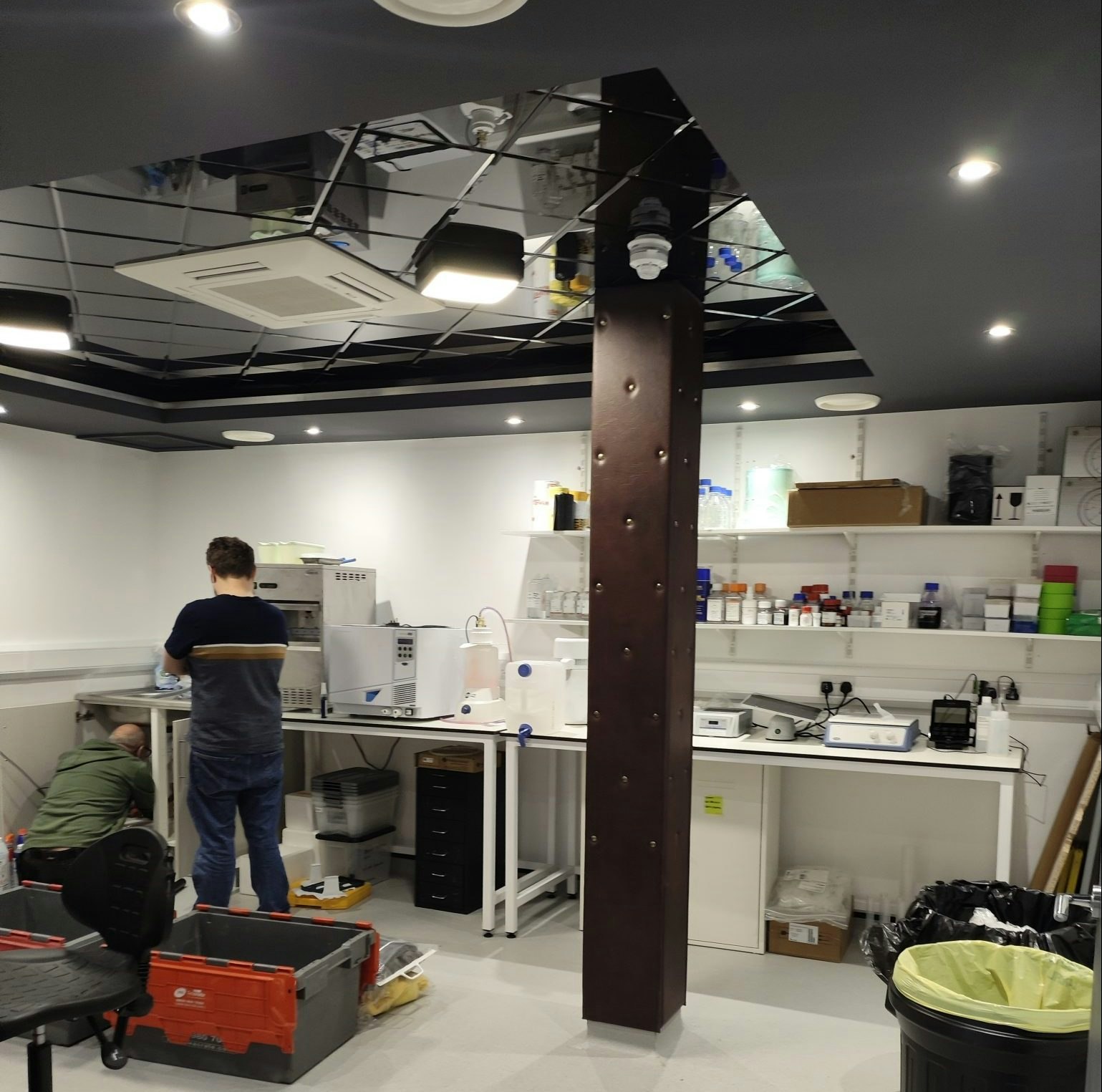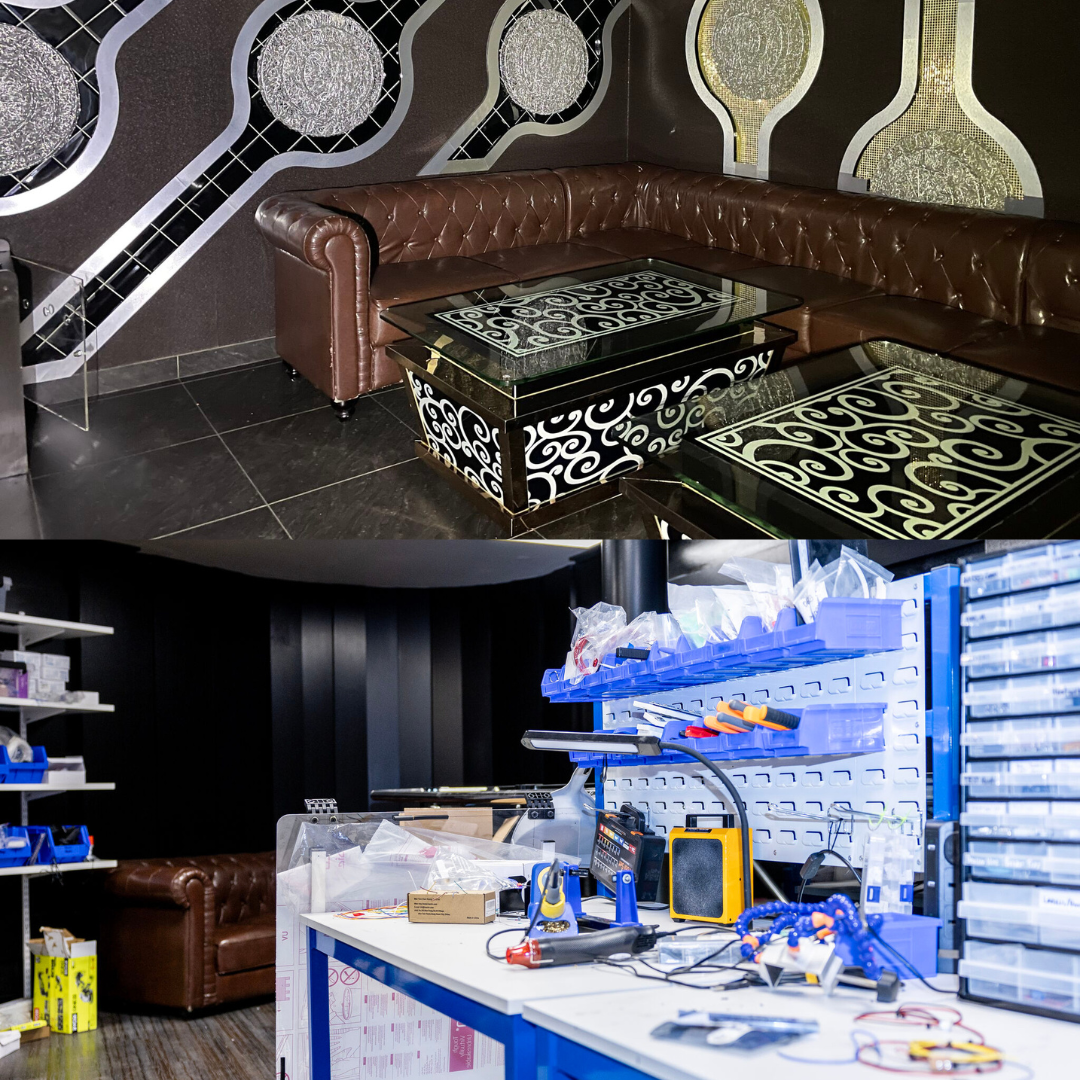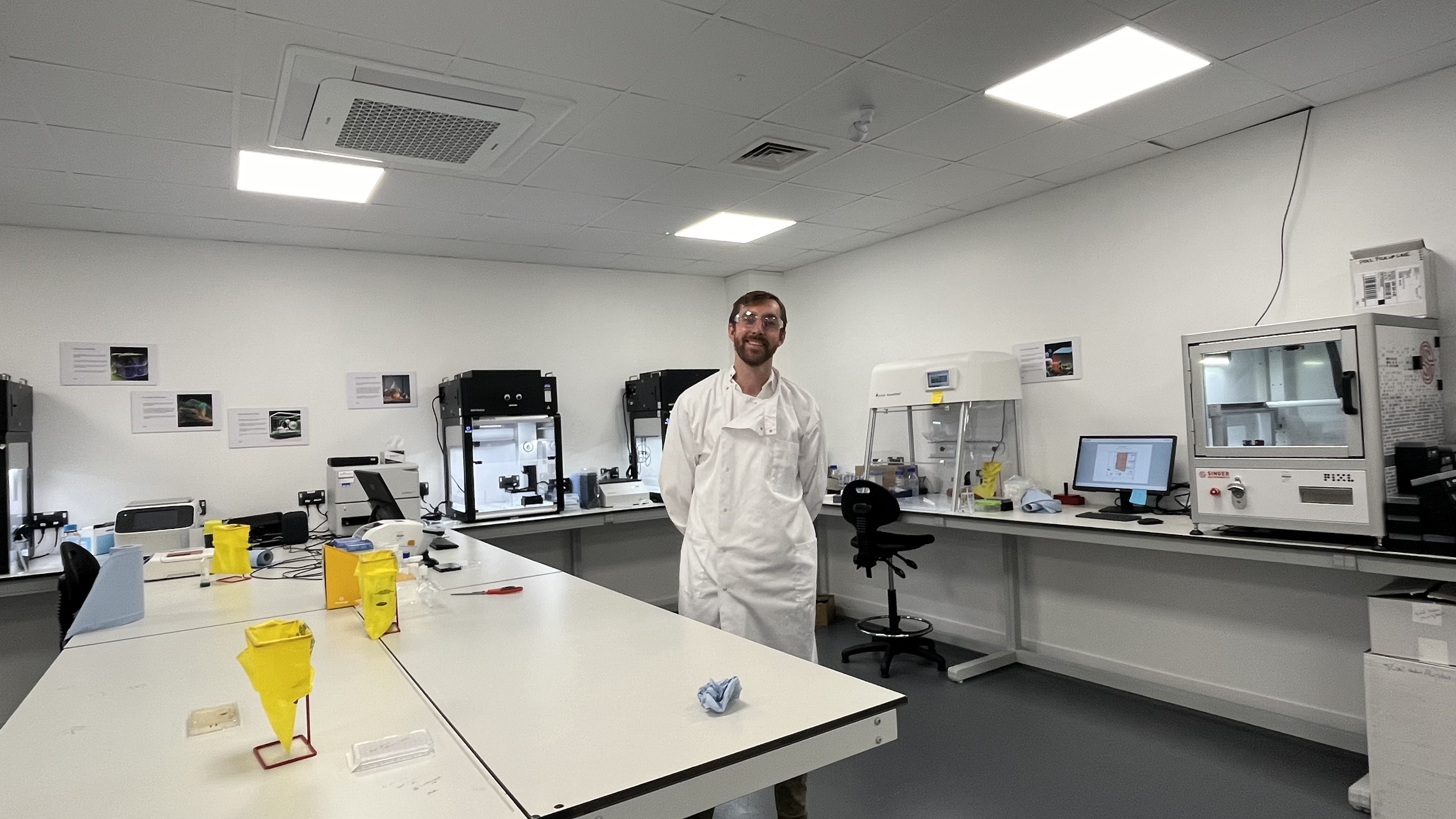As I made my way to visit London-based startup Twig Bio, I assumed I was lost when I turned into an industrial estate a 10-minute walk from the heart of London’s Kings Cross and was hit with the smell of fish marinating in the August sunshine.
I double-checked the map on my phone and (holding my breath) sidestepped the man pressure-washing viscera off a seafood packaging company’s van. After looking around I found the biotech startup’s logo three units down and realised I was, in fact, in the right place.
“The aircon filters [the smell] out quite well,” says Russ Tucker, founder and CEO of the sustainable ingredients company. “It used to be worse,” he adds. “Before we moved in [to this unit], we spent a few months in the unit above the worst part of the smell and it was…” he says, stopping to chuckle.
Twig Bio moved into its bespoke 8,000 sq ft office in Camden in June 2023, which Tucker says is considerably cheaper than the alternatives currently available for biotech startups in the capital — which can go as high as £120 per sq ft each month. “It’s borderline unaffordable for lab space in London,” he says; “you have to be creative.”
Before the unit hosted the startup’s automated robots, desktop screens and sparkling lab spaces, it was a different kind of squeaky clean. “When we came and looked around, they said, ‘Any guesses what it used to be?’ My CSO sniffed, and said ‘a laundrette’ — it still had the smell of laundry,” says Tucker.
Accessing affordable lab space across Europe, particularly in hotspots like London, is an infamous issue across the ecosystem — and Tucker isn’t the only one getting around the problem creatively.

From pints to experiments
After touring a series of decrepit buildings around Sheffield on his hunt for a new lab, Adam Glen, founder of software biotech Unicorn Biotechnologies, found himself in a building that a landlord informed him was a former nightclub.
Six months on from that first viewing, his team had converted the space into a fully functional lab and moved in all of their equipment. What used to be a dance floor packed full of late-night revellers is a desk space for employees; experiments take place under a shiny tiled ceiling and in the middle of the bright, sterile lab stands a pillar padded with brown velour.
“We knocked down walls, we put in doors; we did all of it ourselves. We’re engineers and scientists, we can figure this stuff out. It takes time, but it’s doable,” says Glen.
“We seem to do this thing in the UK where we wait for somebody else to take the initiative, and I don’t understand that,” he adds.
Despite its unconventional past, Glen says that the lab space contains everything his startup needs.

Unicorn Biotechnologies is developing machines to streamline cell culturing for biotech companies. With no hard chemistry element, the company doesn’t require more complicated things like gas lines or wastewater streams, and so it was able to move its equipment in a single day.
Glen adds that some of the building’s original features are beneficial to the startup. “The main things for biotech labs are that it’s clean,” he says, “[and the bar] has a floor that you can clean properly.
“The other really good thing about bars is air conditioning,” he adds, “the air conditioning in biotech facilities is the most expensive thing you will install. Because bars are designed to have lots of people, [they] have quite good air conditioning already.” Commercial air conditioning installation can cost upwards of £10k depending on size and complexity.
While moving in was a quick affair, paperwork meant it took six months before the space was ready to move into.
“We had to do planning permissions, change the use of the building, flood risk assessments. We did this all ourselves, even though these have been done before — the bar hasn’t literally moved closer to water,” says Glen. “So that was the barrier: just trudging through bureaucracy to get it done.” Unicorn Biotechnologies has so far raised $3.2m from investors including SOSV, Acequia Capital and Alumni Ventures.
“Our landlord was extremely supportive,” Glen adds, “because he wanted to change the use of the building anyway, and for people to see it in a different light.”

Importing a US lab model
Twig Bio’s conversion wasn’t done in-house — the project was managed by Co-Laboratories, a company based in London which converts unused spaces into labs and offices. It reached an agreement with Camden Council to repurpose a derelict industrial estate that is set to be demolished in a few years, into affordable labs for startups looking to commit to a shorter-term lease before scaling into a bigger space when needed.
Repurposing ‘unusual’ buildings into lab space is common practice in the US, says Co-Laboratories cofounder Laura Brightman. The first company she worked at after university used a lab built into the basement of a methadone clinic in San Francisco. After a few years of moving between the States and the UK and realising there was an obvious lab space shortage in Britain, she decided to try and bring that model across the pond.
But a lack of funding and subsidies is making things difficult, she says: “I’m too boring for venture capital, because we’re never going to be a billion dollar business, [but] because our business isn’t quite considered innovative, I couldn’t get the riskier business loans.”
Building a space from scratch came in handy for Twig Bio, says Tucker — the team were able to design their spec for the lab, which began as the bare bones of a warehouse unit. Working closely with Co-Laboratories, they outlined the rooms they needed and how the equipment would fit — and are in the process of converting overflow space on the second floor of the unit.
“We were in a fortunate position where we actually paid 12 months upfront to allow them to do that for us,” he says. One barrier for others, however, is that without subsidised projects, not all startups have access to that kind of capital, says Brightman. The unit opposite Twig Bio’s office was being readied as a converted lab space, until the company that had commissioned the project failed to close its fundraise and had to pull out of the deal.

Changing attitudes
While Twig Bio is making use of cheaper square footage, Glen also wanted to expand the biotech hotspots in the UK beyond the ‘Golden Triangle’ of London, Oxford and Cambridge. Real estate agents Knight Frank found there’s demand for 2.2m sq ft of lab space across the three cities, but just 385k square feet available.
“There’s loads of potential in city centres to revamp things,” says Glen — but the problem often lies with the margins of real estate experts. “Developers lean into ‘can we make it into flats’, it’s not their background to do labs,” he says.
But Brightman says there are reasons for more general real estate companies to be cautious.
“Our real estate market is so traditional, they’re very risk averse. They don’t mind the slow returns, but they’re very focused on offices and even though some are now working on labs, they do everything in a very generic — the Americans call it ‘cookie-cutter’ — way,” she says. “They either think it’s more expensive than it is, or they put so much money in that it then becomes a very expensive let.
“I would love for there to be a lab space like this in every major city or innovation centre — I really think we need it,” she adds. “We shouldn’t be the only people doing it, and would be happy to help other people. You shouldn’t have to uproot your whole life to be able to do innovation.”
And while the bar-to-lab transformation may have been an ambitious project, Glen is optimistic that others will be inspired by it.
“I hope this will encourage other people to think around problems,” he says. “Hopefully they go, ‘Well, Adam’s not that smart and he’s been able to do it, so I definitely can.’ It becomes a reinforcing cycle, and then all of a sudden you have a whole industry that just spawned.
“People just need to take action; they don’t get things done. [Founders complain] there’s no lab space – go and build some then!”
Read the orginal article: https://sifted.eu/articles/creative-lab-space-conversions-startups/


